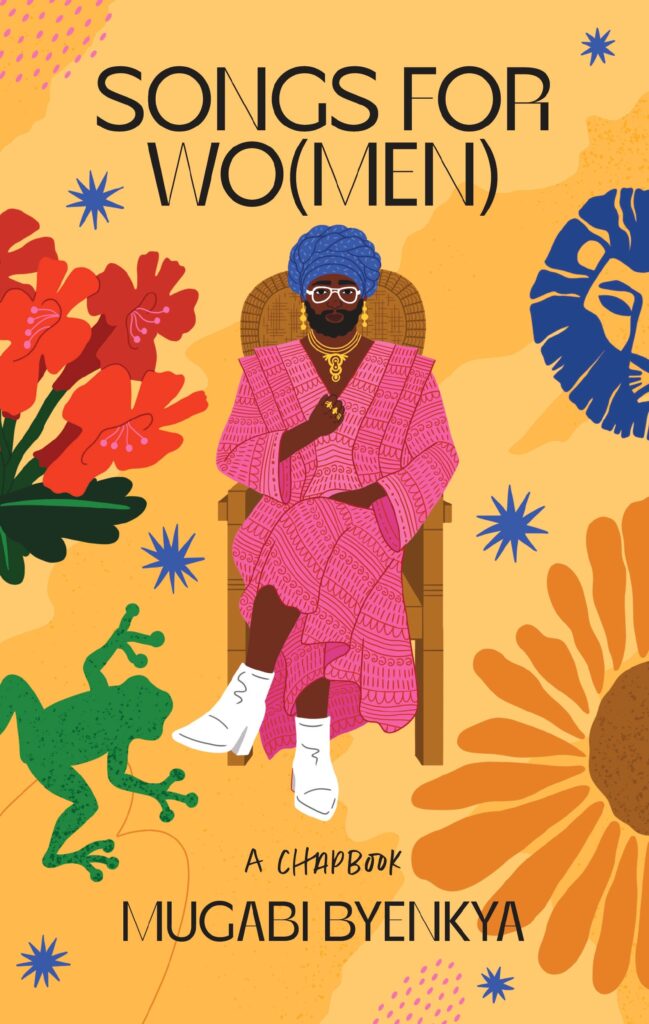
From the start of this very honest and reflective book, you are drawn in to the journey represented in the pages. The story starts with a meeting between Dick and Mugabi, and this weaves an innovative thread through the collection – a carefully thought out seam of dialogue, prose and poetry between the two main ‘characters’. It’s as if these characters form two sides of the author, and the interplay between them plays out to offer different perspectives and contexts of the writer’s journey through life as they move through it.
Dick and Mugabi then, present as two very different characters, Dick being, for me, almost the person Mugabi’s mother wanted him to be, straight, ‘normal’ as it were. While Mugabi, in these dialogic interludes, comes across as the naïve, weaker, almost defensive half of this relationship, struggling to explain himself to Dick at times.
The first glimpse of the difficulties the author has lived through is given with the piece entitled, ‘Eddwaliro’. (Translations of Lugandan words are included and this provides useful context throughout the collection). The final lines of this piece:
Home can be an illusion.
‘Have you ever felt homeless in your own home?’
give some insight into what the author is going through at the start of their passage.
At times the reader is offered some repetition in places which serves to reinforce the ideas embodied in the words. In the poem ‘Don’t Touch My Hair’, there is an emotive insight that disposes of the myth that racial prejudice is always white on black. No prejudice based on race is forgivable, and the words in this poem really bring home the hurt of that which is brown on black:
‘Why am I still exotic as a Black face in a Black space?’
and
[…] I never touched a Black person’s hair before and I just wanted to know/ how it felt.
These are lines that make one realise that exotic was not due to colour alone.
The cruelty of neurodiversity, anxiety and disability plays out in the frank and open poetry contained in these pages. Read about the discomfort in ‘do not judge me by my weak handshake’, and of the suffering played out in ‘Professor Poopy Pants’. Read also of the raw realities of the author’s situation in ‘Pop another pill’:
Self-harm is a release, a way to squeeze all those emotions inside
of me and vindicate them physically
Quell the rising tide of depression and not kill myself tonight
By the time you reach ‘Dick: Scene 4’, it becomes obvious that sexual diversity is now added to the mix of issues covered. I love the poem, ‘Chi’, which reveals a complex inner conflict and resolution using Batman as a metaphor, (who doesn’t love Batman?). This reverberates later in the book with ‘Philomena’s Interlude Pt 3:
[…] I so vehemently disagreed with the mask of masculinity that she was attempting to enforce on me.
You can feel the distress brought on by the lessons from Dick. In just one word, ‘[Gulp]’ the author conveys enough torment to speak volumes. The word ‘I’ in Dick: Scene 7’ has a similar effect. And the cynicism contained within the poem ‘Richard’ makes one writhe inside, so powerful are the emotions borne in the lines, for example:
make him learn to fold into himself
make him learn to lie to himself
The lack of Mugabi in the final Dick scene at the end of the book makes perfect sense. They have gone from being represented in single lines, to single words, to finally nothing. This speaks loudly of how they differ from their friend. This is a fitting way to complete this journey – a journey which bleeds through the book, and which holds such a powerful and moving tale.
Songs for (Wo)Men (2024) is published by The Sheffield Chapbooks, an imprint of Gordon Hill Press. Available for £6 at https://www.gordonhillpress.com/products/songs-for-women
Alison Hramiak is a part time poet and writer living and working in West Yorkshire. She has written poems from an early age and is widely anthologised, including in Forward Poetry collections, New Contexts, Impspired, Consilience Field Notes, and for various charity anthologies. She reviews and edits poetry anthologies and books for charity sites for refugees and immigrants. She performs at open mic sessions (in her native Yorkshire accent) at the Lawrence Batley Theatre in Huddersfield. Her work can be found at www.poetryforlives.co.uk.
